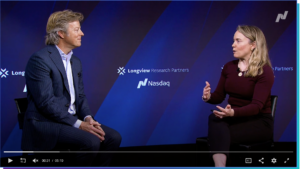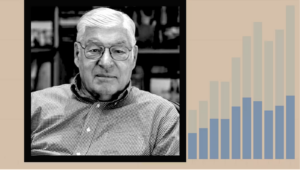Details Are Part of Our Difference
Embracing the Evidence at Anheuser-Busch – Mid 1980s
529 Best Practices
David Booth on How to Choose an Advisor
The One Minute Audio Clip You Need to Hear
Category: A piece we love
March Journal Email Intro – Closing Bell Opening Day

When our last newsletter hit your inbox, it was a milestone day—the official launch of The Longview Advantage ETF. Now, just a month later, we’re off to a fantastic start. One of the highlights? Ringing the closing bell at Nasdaq. It was more than just a photo op (though we’ve included a great one above)—it was a symbol of what this fund represents: long-term thinking, disciplined investing, and alignment with partners who share our values.
What follows is a brief look at why we chose Nasdaq as our listing partner and how that decision reflects the principles at the core of Hill Investment Group and Longview Research Partners.
Why We Chose Nasdaq: A Commitment to Aligned Values
When we decided to launch The Longview Advantage ETF (EBI), we knew that every choice mattered—down to where we listed the fund. Selecting Nasdaq wasn’t just about visibility or reputation; it was about alignment.
At Hill Investment Group and Longview Research Partners (the parent name of the ETF), our core philosophy is built on evidence, transparency, and a forward-thinking approach. These values aren’t just words—they guide everything we do, from the way we serve clients to the investment principles behind our ETF. When we looked at Nasdaq, we saw an organization that operates with the same commitment to innovation, efficiency, and integrity.
Innovation Meets Evidence-Based Investing
Nasdaq has long been a home for companies that challenge the status quo—firms that look beyond convention and embrace a data-driven, systematic approach to growth. That same mindset fuels The Longview Advantage ETF. Our strategy is built on decades of research and combines the most compelling ideas in the evidence-based community into one fund. It’s an approach that requires discipline, adaptability, and the ability to cut through noise—principles that Nasdaq embodies as a leader in market evolution.
Transparency and Efficiency: A Natural Fit
Investors deserve clarity. The mutual fund industry, as we’ve long observed, often thrives on complexity—hidden fees, opaque strategies, and layers of unnecessary friction. Our ETF was designed to strip that away, delivering a low-cost, rules-based investment vehicle that puts investors first. Nasdaq has been at the forefront of this kind of market efficiency, prioritizing technology, access, and real-time insights to ensure investors have the tools they need to succeed.
The Future of Investing
Choosing Nasdaq was more than a logistical decision—it is a statement. We wanted The Longview Advantage ETF to be listed on an exchange that shares our long-term perspective, one that values research-driven decision-making over speculation. Nasdaq has been home to some of the most innovative firms in history, and we’re proud to be part of that ecosystem.
In my recent interview on Nasdaq’s Just for Funds, I had the chance to talk about why The Longview Advantage ETF exists and how it serves advisors and investors who believe in taking the long view. If you haven’t seen it yet, check out the video below.
This is just the beginning of our journey with EBI, and we’re excited about what’s ahead. Thanks for being part of it.
Take the Long View.
Matt Hall
Hill Investment Group
*This communication is for informational purposes only and does not constitute an offer to sell or a solicitation of an offer to buy any securities. Investing involves risk, including possible loss of principal. The performance of any investment strategy, including ETFs, is not guaranteed. Past performance is not indicative of future results. Investors should carefully consider the investment objectives, risks, charges, and expenses of any fund before investing.
A Legend Passes
The investing world recently lost one of its quiet pioneers, Mac McQuown. While his name may not be widely recognized outside our industry, his influence runs deep. A trailblazer in modern investing, Mac’s visionary contributions laid the groundwork for the strategies many investors benefit from today. As David Booth, Co-Founder of Dimensional Fund Advisors, aptly noted, Mac was a true transformer in the field. [Click the quote to read Dimensional’s tribute.]
“Catalyst” is the keyword. There are so many useful nuggets in the attached article in the Financial Times that you’ll be better off reading it. In a short space, you will learn the history of evidence-based investing, the first index fund (Mac’s creation), the birth of many future Nobel Laureates, and their impressive connection to Dimensional, Blackrock, and other global finance leaders.
If you want to know and understand the recipe you’re investing in when investing with Hill, this is one of the better shortcuts to taking the long view you’ll ever read.
Taking the Longview with Jonathan Clements

As we step into the season of giving thanks, I came across a deeply moving piece by former Wall Street Journal columnist Jonathan Clements. At 61, Jonathan is facing a terminal cancer diagnosis, with less than a year to live. Despite this, he’s embracing what he calls “the long view”—not for himself, but for his wife, children, and the causes he cares about.
Jonathan is using the time he has left to do what matters most: have heartfelt conversations, take meaningful action, and leave a legacy of love and purpose. This is a poignant reminder of how precious our time really is.
This resonates with me on a personal level. I’m also 61, and like many, I find myself thinking there’s always “plenty of time.” But the truth is, none of us knows how much time we have. My own career pivot to wealth advising was shaped by loss—my father passed away from cancer at 67, completely altering my life’s direction.
Yet, like the cobbler whose children have no shoes, I realize I still have unfinished conversations with my own family. This season, I’m reminded that it’s never too early to talk, laugh, cry, and share your gratitude with those you love.
Let’s take the upcoming holidays as a chance to do just that. Investing in these moments of connection today—just like investing for your financial future—pays dividends for years to come.
That’s the true meaning of taking the long view.



